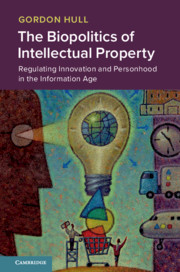 The Biopolitics of Intellectual Property
The Biopolitics of Intellectual Property 3 - Copyright
Published online by Cambridge University Press: 01 November 2019
Summary
This chapter assesses the neoliberalization of copyright law.It begins with the historical emergence of copyright as a form of public biopolitics.It then looks at three areas where copyright has become neoliberal.The first is incentives theory, which treats all creation as an economic calculation geared toward market rewards.I outline the theory, and show how it works not just to model, but to produce a certain kind of creator, to the exclusion of other forms of creativity.The second is litigation around hip-hop sampling.Here the demand for licensing works to nudge music into commercial channels, where all cultural borrowing is mediated through market transactions.The third is the recent expansion of copyright into what scholars have termed “paracopyright”: a prohibition on circumventing copyright protection technologies, which generally function as forms of “digital rights management” (DRM). Through a detailed examination of how DRM technologies (such as the regional restrictions on DVDs) function, I show how this addition to the law clearly marks a move in the direction of copyright into training individuals that they are consumers of the products of culture.
Keywords
- Type
- Chapter
- Information
- The Biopolitics of Intellectual PropertyRegulating Innovation and Personhood in the Information Age, pp. 59 - 97Publisher: Cambridge University PressPrint publication year: 2020
